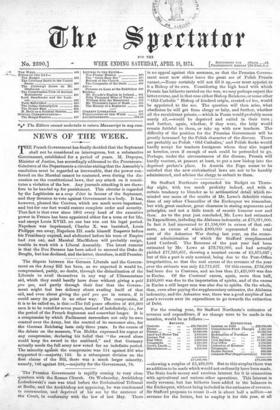The dispute between the German Liberals and the Govern- ment
on the Army Bill has been, as we expected it would be, compromised, partly, no doubt, through the disinclination of the Liberals to avail themselves in any way of Ultramontane aid, which they could hardly have done without giving a quid pro quo, and partly through their fear that the Govern- ment might feel less delicacy about availing itself of that aid, and even about giving the quid pro quo in return, if it could carry its point in no other way: The compromise, if it is to be called so, is this :—The full peace effective of 401,000 men is to be voted for seven years, instead of indefinitely, i.e., for the period of the French Septennat and somewhat longer. It is a compromise by which Parliament surrenders not only its own control over the Army, but the control of its successor also, for the German Reichstag lasts only three years. In the course of the debate on the measure, Von Moltke expressed his regret at any compromise, declaring his belief that "the sword alone could keep the sword in the scabbard," and that Germany actually needs the full army now voted for an indefinite period. The minority against the compromise was 114 against 256 who supported it—majority, 142. In a subsequent division on the first clause of the Bill, there was a much larger minority, namely, 146 against 224,—majority for the Government, 78.


































